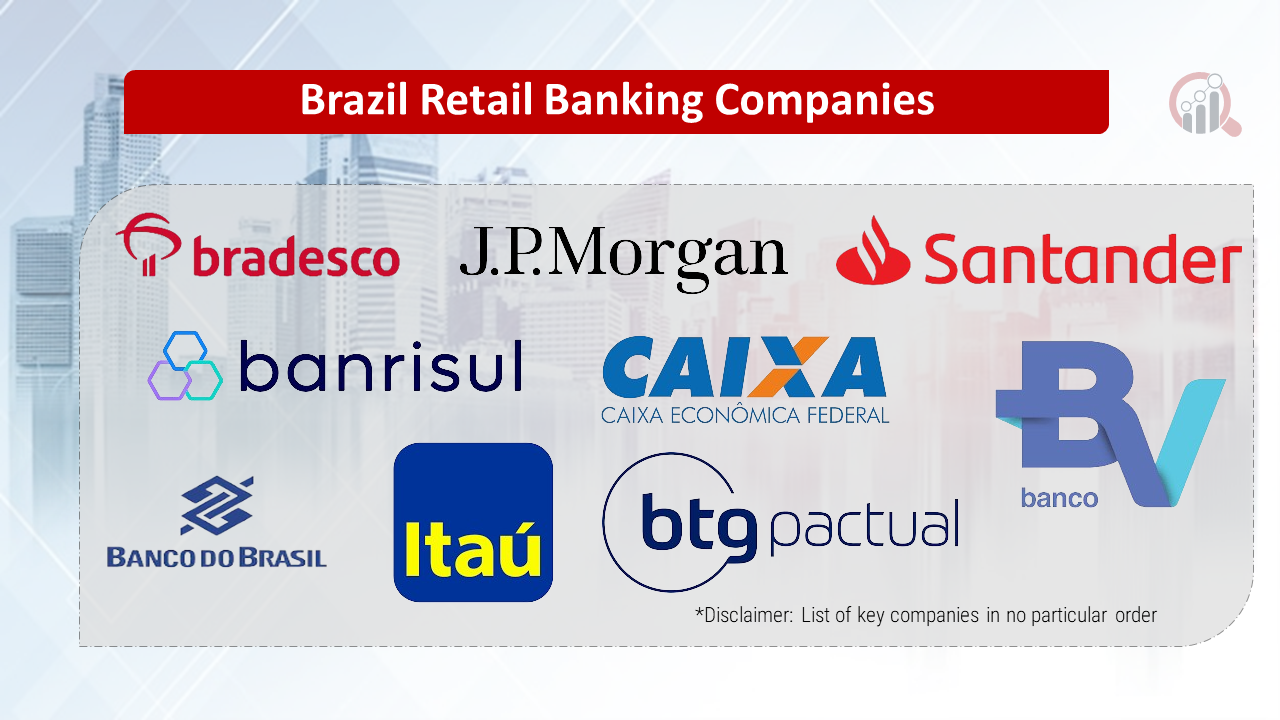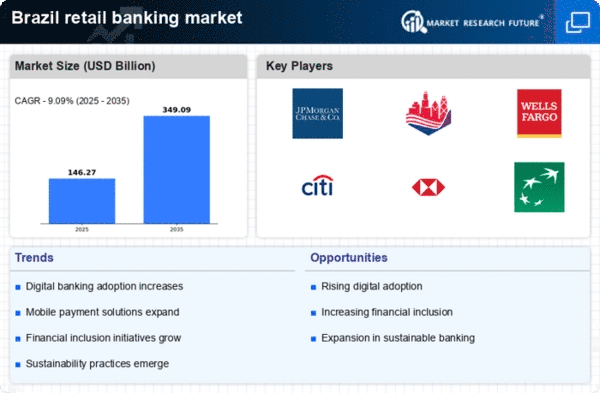Top Industry Leaders in the Brazil Retail Banking Market

Brazil Retail Banking Market: Dive into the Latest News and Updates
The brazil retail banking market is experiencing a surge, driven by a growing population, increasing internet access, and rising disposable incomes. Understanding the key players, their strategies, and the factors influencing market share analysis is crucial for navigating this vibrant and dynamic landscape.
Some of Brazil Retail Banking Companies Listed Below:
- Banco do Brasil
- Itau Unibanco Holding
- Caixa Economica Federal
- Banco Bradesco
- Santander Brasil
- BNP Paribas
- BTG Pactual
- Banco Votorantim
- JP Morgan
- Banrisul
Strategies Driving Market Growth:
- Focus on Financial Inclusion and Digital Onboarding: Offering simplified account opening processes, mobile-first platforms, and micro-loans expands access to financial services for previously unbanked or underbanked segments.
- Tailored Products and Services: Developing customized solutions for different customer segments, such as millennials, small businesses, or rural populations, caters to specific financial needs and preferences.
- Focus on Security and Innovation: Implementing robust cybersecurity measures and adopting emerging technologies like AI and blockchain builds trust and facilitates secure, efficient banking experiences.
- Strategic Partnerships and Collaborations: Partnering with fintech startups, retailers, and non-financial institutions expands reach, facilitates cross-selling opportunities, and fosters a collaborative financial ecosystem.
Factors Influencing Market Share Analysis:
- Target Market and Customer Segment: Understanding the specific financial needs and preferences of different demographics, such as low-income populations, first-time homebuyers, or micro-entrepreneurs, is crucial for tailoring products and achieving market success.
- Distribution Channel Strategy: Balancing established branch networks with strong digital platforms provides convenience and caters to diverse customer preferences for accessing banking services.
- Technology Integration and Innovation: Continuously investing in digital solutions, data analytics, and AI-powered tools optimizes operations, personalizes offerings, and enhances customer experience.
- Regulatory Environment and Compliance: Adapting to evolving regulations around data privacy, consumer protection, and Open Banking fosters trust and ensures compliance with legal frameworks.
New and Emerging Companies:
- Focus on Niche Markets and Alternative Data: Startups like Creditas (mortgage lending), Geru (credit for low-income communities) target specific segments and utilize alternative data sources like utility bills or purchase history, expanding access to credit for underserved populations.
- Embedded Finance and Open Banking Solutions: Companies like PagBank (owned by PagSeguro) integrate banking services within other platforms, providing convenient access to financial services within familiar ecosystems.
- Focus on Financial Wellness and Education: Players like Nubank, Neon offer financial literacy resources and budgeting tools within their mobile platforms, promoting responsible financial management and user engagement.
Current Investment Trends:
- Venture Capital Funding: Innovative fintech startups developing mobile-first platforms, niche financial solutions, and AI-powered tools attract significant venture capital funding, fueling market diversification and innovation.
- Strategic Acquisitions and Partnerships: Established players are acquiring fintech startups or forging strategic partnerships to expand their digital capabilities and reach new customer segments.
- Investments in Cloud Computing and Digital Infrastructure: Growing investments in cloud infrastructure and digital platforms ensure scalability, security, and facilitate the delivery of innovative banking services.
Latest Company Updates:
- Mar 17, 2024: The Brazilian government announces plans to launch a central bank digital currency (CBDC) pilot program later this year.
- Feb 14, 2024: Concerns rise over rising cybercrime targeting Brazilian banks, prompting financial institutions to invest in cybersecurity measures.










